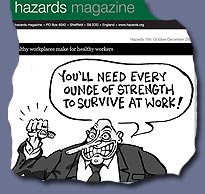Just Who Is Really Shirking At Work?
Employers should sort out unhealthy jobs before they start lecturing workers about their lifestyles, according to a new report in a trade union health and safety journal.
 Hazards magazine notes: 'They'll weigh us, keep tabs on our bad habits and ask questions when we are sick,' but adds 'when we fall short of perfection, they label us shirkers, sickos and slobs.'
Hazards magazine notes: 'They'll weigh us, keep tabs on our bad habits and ask questions when we are sick,' but adds 'when we fall short of perfection, they label us shirkers, sickos and slobs.'
The report questions whether all this attention from employers is really for workers' own good.
It points to studies showing lifestyle initiatives at work are on the increase.
'Working well: A global survey of health promotion and workplace wellness strategies', published in November 2008 by Buck Consultants, found in the UK 40 per cent of those surveyed now offer a 'workplace wellness strategy' - approximately double the percentage the preceding year, with 16.4 per cent of UK respondents now having a fully implemented a health promotion and wellness strategy and 34.5 per cent a partially implemented strategy.
Only 3.6 per cent reported that that they had no plans at present for a wellness strategy.
The Hazards report says these approaches, instead of addressing job insecurity, long hours, monotony, work hazards, staffing shortages, sedentary work and excessive workload, increasingly look exclusively at modifying workers own personal habits. It adds: 'Strapping on a pedometer or signing up for a lunch-time diet programme will be of limited use if the worker is still spending 10 hours a day working frantically in front of a computer or a production line.'
The Hazards website details a case of a Firefighter and argues against the government's strategy of forcing benefit claimants and disabled workers into jobs that are underpaid, and badly designed.
It must also be noted that Job Centre Plus is about to be privatised and run by the private sector, and many fear that the agency will then only concern itself with figures and targets and not give a damn about the quality and suitability of the jobs they force those with disabilities into taking.
The same article also highlights the fact that “Health at work” initiatives, instead of addressing job insecurity, long hours, monotony, work hazards, staffing shortages, sedentary work and excessive workload, increasingly look instead at modifying workers own personal habits. It exemplifies, Well@Work, a two-year British Heart Foundation (BHF) project that concluded in summer 2008 and which was funded by £1.5m of government and lottery cash, introduced measures such as pedometers, health checks and fruit giveaways. It involved 32 workplaces employing 10,000 staff in public and private sector workplaces.
It goes on to point out that: "... the funding for the project has now ended. And although in some workplaces some workers took more exercise and ate more healthily, most didn’t. And to extend this project across the UK’s 28 million plus workers would cost in excess of £2bn a year – over seven times Health and Safety Executive’s (HSE) annual budget."
See also the TUC's: Promoting health at work: Guidance for safety representatives
Source: TUC Risks



